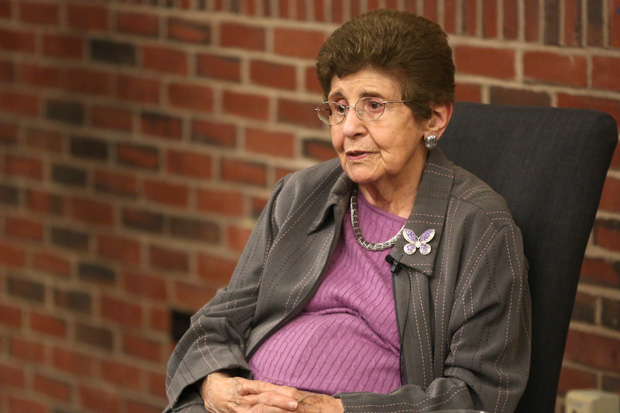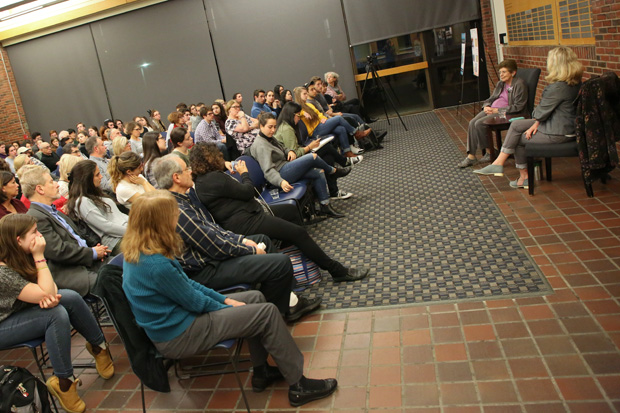Holocaust survivor Rena Finder: ‘It’s happening again, today’
 Photo/Mike Lovett
Photo/Mike LovettHolocaust survivor Rena Finder, who is also one of the 1,200 people on Schindler's List
Rena Finder’s life mission is to raise awareness about the Holocaust and speak out against bigotry.
The 89-year-old Krakow native has her own harrowing story to share. She was one of nearly 1,200 people saved by German industrialist Oskar Schindler, and survived the horrors of Auschwitz-Birkenau.
But Finder suggests that there may have been something worse than the brutality and hopelessness of Auschwitz: The apathy and sudden betrayal of her former neighbors and friends.
“It all happened so suddenly, almost as if it was just overnight,” Finder told a packed gathering in the International Lounge at Brandeis on Nov. 7 when describing the start of the Nazi occupation in Poland. “Then, it was just one thing after the other. First Jewish children weren’t allowed to go to school, then we are all made to wear a white band with the blue Star of David, then we were forbidden from shopping in the city center, then we were forced into the ghetto.”
Finder, who visited campus with support from Facing History and Ourselves and the Center for German and European Studies, recalled the cruelty of being led to the Plaszow concentration camp.
“When we crossed the bridge to leave the city, many people – many of our former neighbors – hurled rocks and mud at us,” Finder said.
“They turned on us, the people they used to live with, as if they couldn’t see us anymore,” Finder added. “It’s like the whole world went black and white and we were just invisible.”
Finder met Schindler in 1939 when he bribed the Nazi Gestapo into letting him use Plaszow prisoners in his munitions factory. Schindler, a non-Jew, kept his workers well-rested, fed and healthy.
However, Finder’s time in Schindler’s factory was short-lived. In 1944, the Schutzstaffel ordered Schindler to cease operations and transported his workers to Auschwitz. But Schindler worked to reclaim his former workers, even as they struggled in the concentration camp.
He wrote out a list, now known as Schindler’s List, which contained the names of his workers, one of whom was Finder; he then negotiated with the SS to grant those on the list transportation to his new factory in Czechoslovakia.
Finder, who recalls viewing Schindler as if he were an angel during her childhood, used his example as a model for today’s society to confront bullies and injustice.

Rena Finder speaks to students, faculty and staff gathered inside the Usdan Student Center at Brandeis
She also took questions from the students, staff and faculty gathered in the Usdan Student Center regarding her life after being liberated from Auschwitz, how she discusses the Holocaust with her children, her emotions when she eventually returned to Poland to visit her former home, and the role today’s generation can play in fighting genocide.
“I share my story because this is something that we cannot allow to be forgotten,” she said. “But today, it feels similar to Kristallnacht in 1938. It’s really a tragedy what recently occurred in Pittsburgh...people are still turning away, even when the same thing is still happening.”
Categories: General





